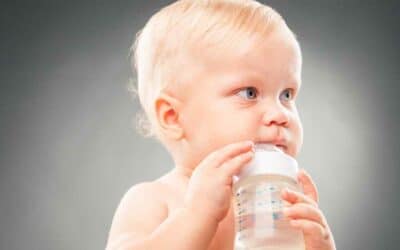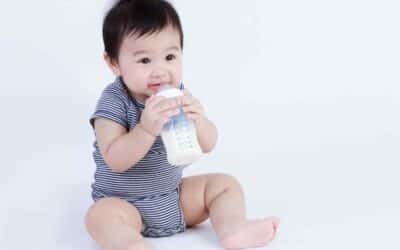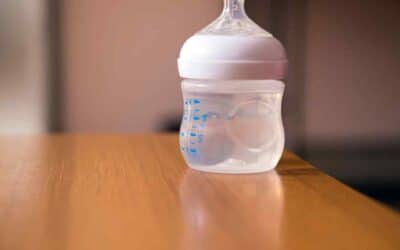Welcoming a newborn into your life is filled with awe, boundless love, and a fair share of learning. As you navigate the first year of parenthood, your days are likely sprinkled with a sense of wonderment at witnessing your child’s understanding of the world blossom and their little body grow.
This blog serves as your companion through this beautiful tapestry of transformation, highlighting the vital developmental milestones your baby is anticipated to reach throughout their first year. Understanding these stages will bring clarity to your baby’s growth patterns and foster a deeper bond between you and your little one as you gain insights into their blossoming capabilities and needs
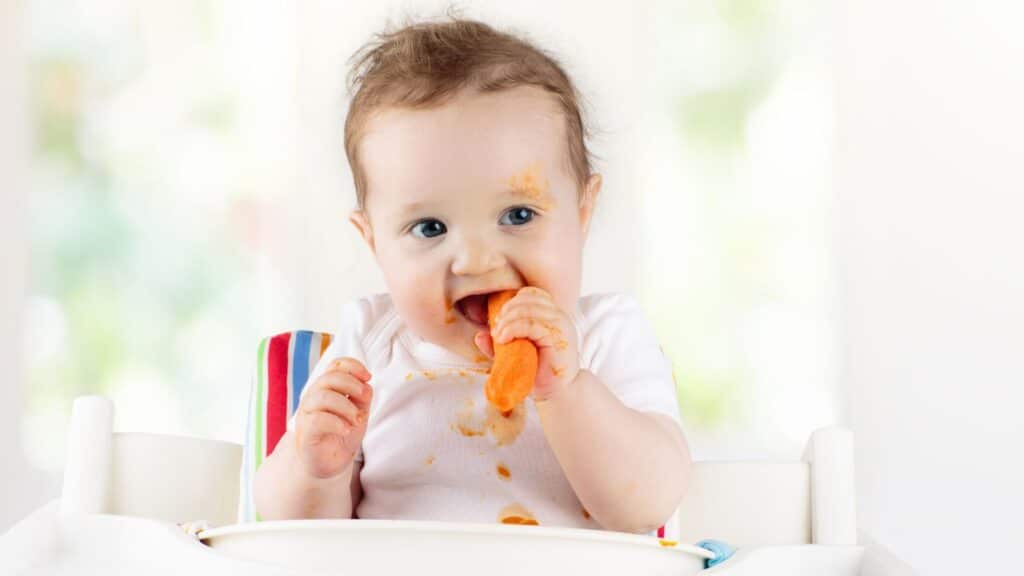
Newborn Development: Birth to 1 Month
The first month of your baby’s life is a fascinating period of rapid child’s development and discoveries. As new parents, you can’t help but marvel at their perfect tiny features and their delicate instincts. During this time, it’s essential to understand their basic developmental milestones and navigate the challenges of these initial weeks.
Whether it’s recognizing your scent or latching for breastfeeding, your baby will start to reach certain milestones, each one an exciting development in their short life. It’s also during these first few weeks that you may need to visit the child’s doctor for routine check-ups to ensure your baby is developing healthily and hitting the necessary milestones. Rest assured, every baby develops at their own pace, so you don’t need to feel anxious if your baby takes a little more time to reach certain milestones.
Understanding Newborn’s Senses and Reflexes
Your newborn has a limited but rapidly evolving sensory system, and reflexes that will soon develop into controlled movements. One notable progression is when they start putting objects into their mouth, a crucial part of their discovery phase. Here’s a breakdown of these senses and instincts to help you understand their cues:
- Touch: Your baby’s sense of touch is highly developed at birth, especially around the mouth and the palms of their hands. Skin-to-skin contact plays a crucial role in bonding and comforting your newborn. It also lays the foundation for their ability to explore food textures when introducing finger foods.
- Smell: Newborn babies can recognize their mother’s scent shortly after birth, an essential attribute for feeding and bonding. This extremely developed sense of smell helps the child familiarize themselves with their environment.
- Taste: Newborns possess a well-developed sense of taste, preferring sweet flavors from the beginning. This sense plays a critical role when introducing solid foods and can influence their food preferences.
- Hearing: Although a bit muffled, your baby can listen to noises and gradually begin to recognize your voice due to your constant communication. This early auditory development primes your baby for language acquisition and social interaction.
- Sight: When nursing or bottle-feeding, newborns’ vision is limited to 8-10 inches initially, which is just about the distance between their face and yours. Over the next few months, your baby’s vision will significantly improve, notably their depth perception, enabling them to make out simple shapes, contrast images, and primarily focus on faces.
Typical Sleep and Feeding Patterns
During the first month, most babies will sleep for 16-18 hours a day, usually waking up only to eat – much like saying a temporary ‘bye bye’ to the world as they drift into their slumber. Their sleep patterns can be erratic, with no specific sleep schedule, which can be draining for new parents. It’s normal for your newborn to have short sleep cycles, but they will gradually establish a more predictable sleep routine as they grow.
Feeding is essential for growth and development, and at this stage, they require feeding every 2-3 hours. Babies typically consume 2-4 ounces of breastmilk or formula per feed. It is important to remember that these guidelines may vary as most children are unique in their feeding needs. Monitor your baby’s wet diaper count to ensure proper nutrition – you should expect at least six wet diapers daily.
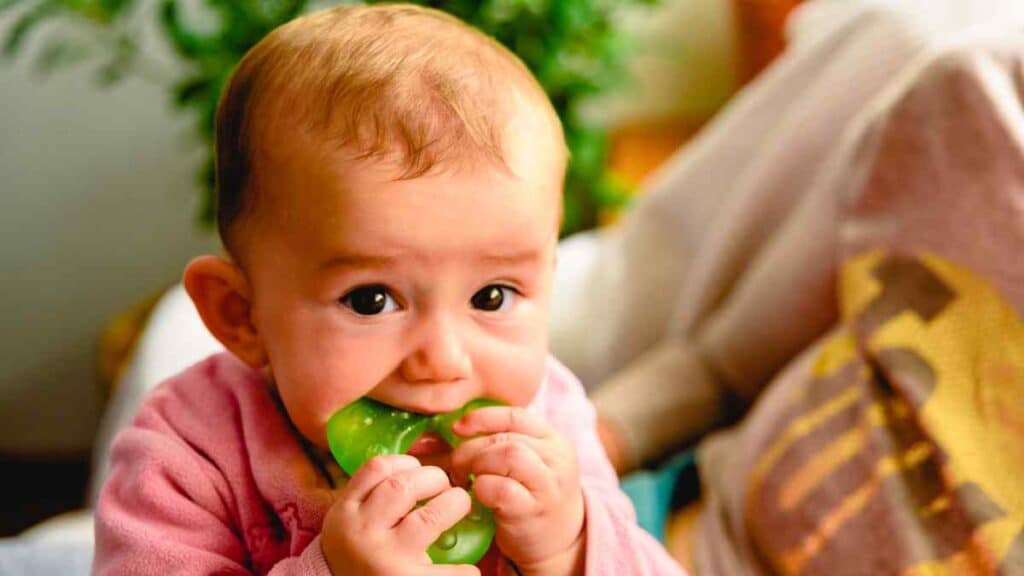
Baby’s Physical Changes
Your baby will undergo enormous physical development within their first month, including significant strides in their fine motor skills and gross motor skills. Here are a few notable changes you can expect:
- Weight: After an initial weight loss of around 5-10% in the first week, your baby will start gaining weight steadily. Regular weight checks ensure their nutrition intake is supporting their growth needs.
- Soft Spot: The fontanelles, soft spots on your baby’s head, will harden in the coming months. This process allows room for the brain to grow during the first year.
- Umbilical Cord: The umbilical cord stump will dry up and fall off within 1-3 weeks after birth. This is part of the natural healing process after your baby’s separation from the placenta.
- Skin: The newborn’s skin may peel and appear to have a rash or baby acne, which is common and will resolve independently. The skin changes can be part of their adaptation to life outside the womb.
- Growth: Your baby’s body will overgrow; consult your pediatrician if you have questions about length, weight, and head circumference. Their physical size increase will typically align with their development of motor skills.
Along with these physical changes, you’ll likely notice your baby start to grab objects, indicating the development of their gross and fine motor skills. Remember, as you embark on this incredible journey, each baby is unique and will grow at their own pace. Understanding the range of typical developmental milestones and your newborn’s cues will help you forge a strong bond and lay the foundation for their healthy growth and development.
Infant Milestones: 1-3 Months
As your baby marks their first month and steps into the second and third months, they will start revealing newly found abilities each day. Here’s what you can expect regarding physical, cognitive, and social-emotional development.
Physical Development: Turning Head, Stronger Neck, and More
Your baby’s physical development at 1-3 months old is rapid and exciting. During this period, you will notice some significant material changes, such as:
- Head Control: Your baby will begin to have a stronger neck, allowing them to lift and turn their heads while lying on their tummy. Tummy time is crucial to developing this strength and should be encouraged.
- Hand Movements: You will observe your infant starting to uncurl from the newborn’s fetal position. They slowly move their hands before their face and might even reach for small objects. As they grow, they will learn to hold objects correctly when they reach a certain age.
- Physical Growth: From the first month, your infant’s rapid physical growth continues, with significant weight gain and length increase. This growth is an essential aspect of their overall development, setting the stage for further motor and cognitive skills throughout their infancy.
Cognitive and Sensory Development: Recognition of Parent’s Voice, Eye Contact, and More
During these months, your baby will also start displaying advances in cognitive and sensory development, progressing through various developmental stages:
- Recognition of Parent’s Voice: Your baby will start recognizing your voice and responding to auditory stimuli around them. You may notice them turning their head toward familiar voices or sounds.
- Eye Contact: You’ll see your baby make direct eye contact. Their vision also keeps improving, allowing them to focus on objects about 8 to 12 inches away. Their depth perception will gradually develop, enabling them to distinguish between near and far objects.
- Early Exploration: They will start to explore the world using their mouth, resulting in a lot of mouthing and sucking of their hands and toys.
It is essential to observe and engage with your baby to support their cognitive and sensory development actively. Encourage eye contact, play with age-appropriate toys, and talk to your baby frequently. Monitoring their progress through developmental stages helps to identify any potential developmental delays early on, ensuring timely intervention and support.
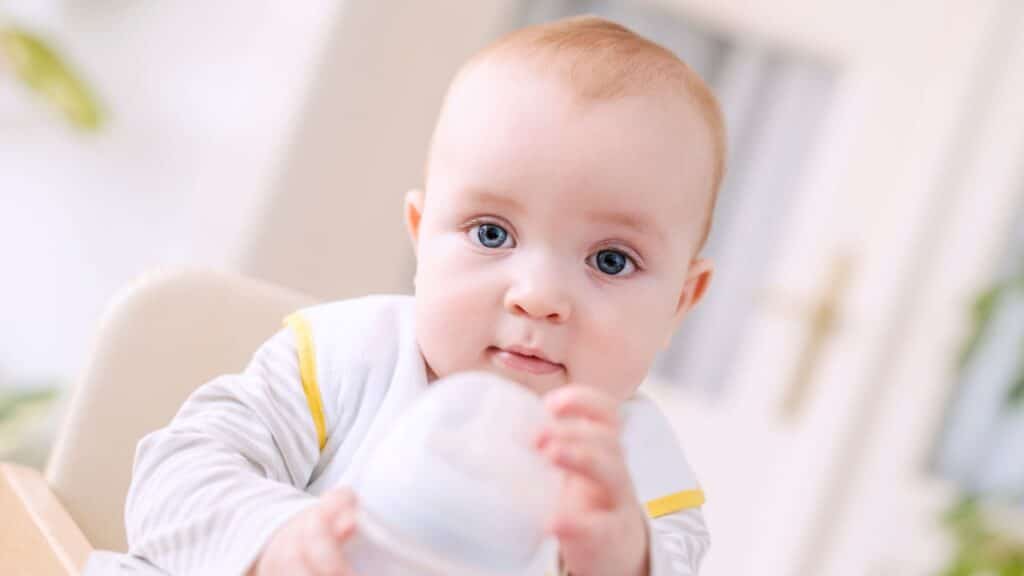
Social and Emotional Development: First Smiles, Cooing Sounds, and More
In terms of their burgeoning emotional and social development:
- First Smiles: Your baby’s first genuine smiles will appear between six and twelve weeks, a magical milestone known as the ‘social smile.’
- Cooing Sounds: During these months, your baby will start ‘talking’ by cooing and making goo-goo sounds that will soon become babbling.
- Social Interaction: Your baby will become more interested in social interaction, responding to your affection and maybe even trying to imitate your facial expressions.
Baby Milestones: 4-6 Months
The milestone journey of your infant takes a giant leap as they reach the age of 4 to 6 months. During this phase, you will be surprised and delighted to witness significant developmental progress in the physical, cognitive, and social-emotional areas. Here is a detailed look at what’s in store for this period of your baby’s life.
Physical Development – Rolling Over, Sitting With Support, and Grasping Objects
Physical growth and development during this period are rapidly noticeable, ushering in significant milestones in your baby’s language development and standing position.
- Rolling Over: One of the significant breakthroughs in this period is when your little one starts to roll over. Initially, the baby will move from their stomach to back. Eventually, they learn to roll from back to belly, which requires more arm strength. Always ensuring their play area is baby safe and supervised during this baby time is crucial to their safety.
- Sitting With Support: Around the 4-6 month mark, your baby will attempt to sit up with assistance or with the support of their hands in front of them. This ‘tripod’ stance is a significant milestone towards their progression into a standing position independently, which might occur in the next few months.
- Grasping Objects: By this time, your baby’s hand-eye coordination has improved tremendously. They can successfully see an object, reach out, and grab it. This development stage is instrumental in their exploration and language development, as they learn to interact more with their environment. However, this can lead to everything and anything going directly into their mouths, so ensuring their play area is safe becomes critical.
Cognitive Development – Babbling, Response to Name, and Awareness of Environment
In the first few months, your little one’s cognitive development begins to shine and takes center stage.
- Babbling: Your baby’s coos and sounds will continue to evolve into strings of consonant-vowel combinations known as babbling. Not only is babbling an essential developmental milestone, but it is also the precursor to the language learning process.
- Response to Name: It can be a magical moment when your baby turns their head upon hearing their name. This shows their growing understanding and recognition of their self-identity.
- Awareness of Environment: With improved vision and cognitive abilities, your baby’s understanding of their surroundings bunches up. You might notice them becoming more interested in the world around them, reaching out to explore objects, sounds, and movements.
Emotional & Social Development – Display of Different Emotions, Recognizing Parents and Loved Ones
Finally, the child’s social-emotional development becomes increasingly complex and interactive during these months.
- Display of Different Emotions: Subtle changes occur in your baby’s emotional show. You might see signs of distinctive reactions like joy, surprise, anger, or frustration. This expanded array of emotions deepens your connection and communication with your baby.
- Recognizing Parents and Loved Ones: At this age, your baby begins to identify primary caregivers and other frequently seen faces and can show excitement or joy upon seeing them. This recognition and preference for familiar faces is a sign of healthy attachment development between the baby and their caregivers.
This developmental stage of your baby’s life is a fascinating time filled with milestone moments. It’s essential to remember that every baby progresses through these stages at their own pace. If you have concerns about your baby’s development, always consult your pediatrician or a child development specialist.

Baby Development: 7-9 Months
Once your baby reaches the age of 7-9 months, you will see them hit some significant developmental milestones. These few months are vibrant, filled with explorative energy, and considerably interactive. Below, you will thoroughly examine what awaits you and your little one!
Cognitive Milestones: Object Permanence, Understanding “No,” Simple Problem-Solving
This age also brings cognitive leaps that show your baby’s growing understanding of the world.
- Object Permanence: Your baby can now understand that things continue to exist, even when they can’t see them. This cognitive skill is called ‘object permanence.’ It forms the basis for the enchanting peek-a-boo game your baby continues to fall for.
- Understanding “No”: This might not always be the most celebrated milestone for parents, but it’s a significant one nonetheless. Your baby will begin to understand the basic concept of the word “no,” even though they may not always abide by it.
Toddler Milestones: 10-12 Months
As your little one afternoon orientates their first birthday and officially becomes a toddler, the 10-12 months mark becomes an exhilarating period full of achievements and discovery. Below are detailed descriptions of what you can expect during this transformative stage of your baby’s life.
Physical Development – Cruising Around Furniture, Maybe First Steps
These months are buzzing with locomotive advancements. Your toddler is becoming increasingly mobile, navigating and experimenting with the world around them.
- Cruising Around Furniture: You’ll notice your little ones gain confidence in their mobility as they start rolling or moving around while holding onto furniture. This newfound freedom allows them to explore their environment in new and exciting ways and is often a precursor to walking independently.
- Maybe First Steps: Every parent eagerly awaits their baby’s first steps. Although this milestone differs vastly in timing between children, some may take their first solo steps between 10-12 months. Remember, early walking isn’t necessarily akin to advanced development; babies learn at their own pace.
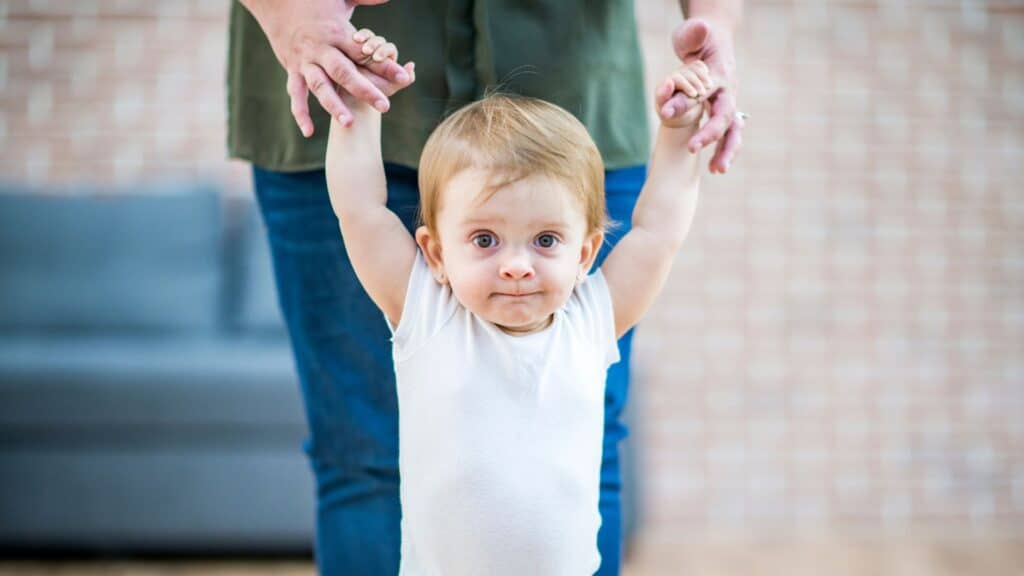
Conclusion
In conclusion, your baby’s first year is a whirlwind of delightful milestones and precious moments as they grow physically, cognitively, socially, and emotionally. As a parent, watching and nurturing your child through these stages is a fascinating journey and a testament to your unending love and dedication. It is essential to remember that every baby is unique and develops at their own pace, so focus on creating memorable moments and fostering a strong bond with your little one.
Keep an open dialogue with your pediatrician, and don’t hesitate to reach out if you have any concerns regarding your baby’s growth and development. Embrace the beautiful tapestry of your baby’s transformation during this first year. Cherish the magic of witnessing their budding senses, sleepy smiles, heartwarming coos, and the thrilling steps they take toward independence. With patience, love, and support, you can guide your baby through this incredible journey while strengthening the connection that will last a lifetime.
Please comment below if this article helped you. If you have any questions, don’t hesitate to ask!

